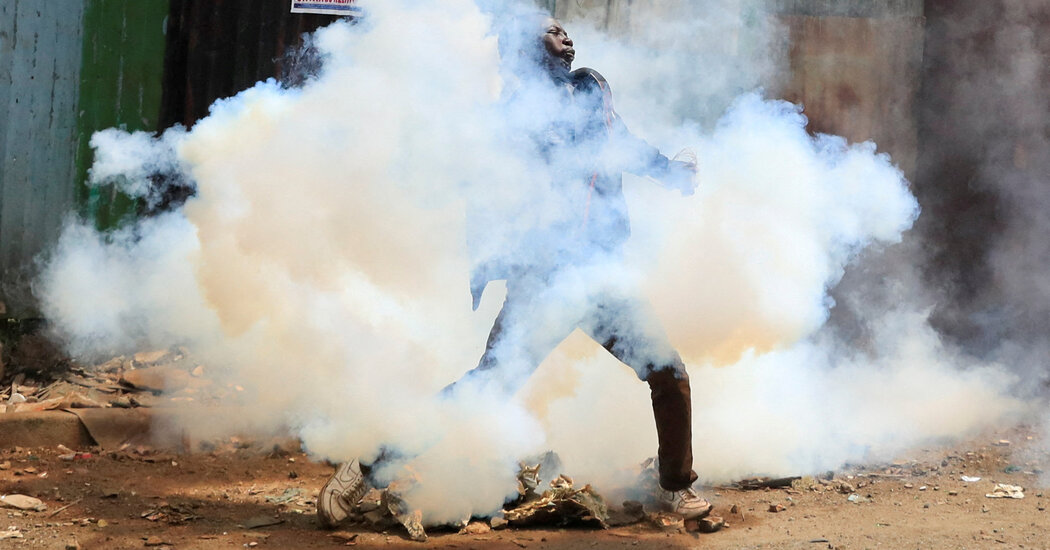Kenya’s boisterous news outlets are normally fierce rivals. But on Thursday they set aside their competitive instincts to issue an urgent appeal for calm as Kenya plunged deeper into chaotic anti-government demonstrations that have left at least 31 people dead in recent weeks and present the gravest challenge yet to the nearly year-old rule of President William Ruto.
“Let’s save our country,” read an identical banner headline across the front pages of the Daily Nation, Standard and other major papers.
Kenya risks tumbling into “a dark and dangerous abyss,” the joint article said, if its leaders fail to resolve a boiling crisis that has destabilized one of Africa’s strongest democracies.
Police clashed with demonstrators on Thursday in the second of three days of planned nationwide protests against soaring food and fuel prices and steep tax hikes. Two people were killed on Thursday, according to local news media, in protests in Kisumu, a western city and opposition stronghold. On Wednesday, six people in the country were killed in clashes when police fired live rounds, and about 300 were detained.
Clouds of tear gas and black smoke from burning tires drifted over the capital, Nairobi, and several other cities, where running battles between the police and protesters caused businesses and schools to close on Wednesday. On Thursday, the police appeared to be gaining the upper hand, and some stores and schools reopened.
The United Nations Human Rights office, citing reports that Kenyan police killed 23 people in protests last week, called for an investigation into the “disproportionate use of force.” On Wednesday, protests erupted in 13 of Kenya’s 47 counties — fewer than last week, said a Western diplomat speaking on the condition of anonymity because they were not authorized to speak publicly.
The protests are led by Raila Odinga, the opposition leader defeated by Mr. Ruto in last August’s presidential election — a loss he still refuses to formally accept, even though election observers and Kenya’s Supreme Court validated the result.
Since March, Mr. Odinga has periodically held mass rallies accusing Mr. Ruto of rigging the election and mismanaging the economy. He is tapping into a deep wellspring of public frustration at the rising cost of living, with wheat prices up 30 percent and sugar up 60 percent in the past year.
“The president is hard on us,” Anne Gakoi, a basket trader, said at her roadside stall on the northern edge of Nairobi. She reeled off a list of the items now too expensive: sugar, maize flour, her daughter’s school fees, the sisal to make her baskets.
Then Mr. Ruto rammed through an unpopular new tax to build more housing. “We can make our own money, and build our own houses,” she said. “He’s not being fair on us.”
But as Mr. Odinga’s largely poor supporters, many from his ethnic Luo group, confronted armed Kenyan riot police on the street, in private his representatives are issuing demands that focus more narrowly on political self-interest, diplomats and analysts said in interviews. Mr. Odinga is seeking a number of concessions including a top posting at the African Union.
Some on Mr. Odinga’s team are seeking a new “handshake” — a reference to the political truce he agreed to with the previous president, Uhuru Kenyatta, in 2018, that effectively neutered Kenya’s parliamentary opposition for the following four years.
There has been no sign of Mr. Odinga this week, leading to speculation on social media. On Wednesday, his daughter Winnie said in a Tweet that he was “fine.” Mr. Odinga’s aides have privately told Western officials that he has the flu.
Much of Kenya’s economic woes are the product of global headwinds beyond Mr. Ruto’s control, such as the war in Ukraine and rising interest rates. The Kenyan president, who was previously vice president, inherited a national debt that quadrupled to $61 billion in the past decade.
But Mr. Ruto also stoked popular anger by meting out harsh economic medicine to his own supporters and adopting an uncompromising stance toward critics.
“Listen to me carefully,” Mr. Ruto said on Friday in a speech in which he vowed to crush the protests. “You cannot use extrajudicial, extra-constitutional means to look for power in Kenya. Wait for 2027. I will beat you again.”
Kenyan religious and business leaders, as well as foreign diplomats, say they have reached out to both sides in recent days in an effort to broker a deal to end the protests. The specter of the post-election clashes of 2007 and 2008, which caused hundreds of deaths and nearly tipped the country into civil war, looms large.
The protests have cost the country about $20 million each day, not counting lost foreign investment, according to Kenya’s national statistics agency. While Kenya has long been seen as the economic powerhouse and prime tourist destination of East Africa, some investors are now looking to neighboring Tanzania, for decades its poor neighbor, as a more attractive option.
The focus of the protests is a tough new finance bill, signed into law by Mr. Ruto last month, that includes a deeply unpopular 1.5 percent levy on salaried workers for a housing and jobs fund. A Kenyan court blocked the law recently, citing constitutional irregularities. Even so, Mr. Ruto pressed ahead with other measures, including a doubling of the fuel tax to 16 percent — a measure that hit his own voters hard.
In last year’s election, Mr. Ruto painted himself as the champion of Kenya’s “hustlers” — young people who, like him, had come from modest backgrounds and were striving to get ahead. But now many of those hustlers, feeling betrayed, are taking to the streets.
“Never should we take it for granted that we can never tip into full-scale genocide or civil war,” Kenya’s editors wrote on Thursday. “We must all step back and take a long, hard look at ourselves.”



